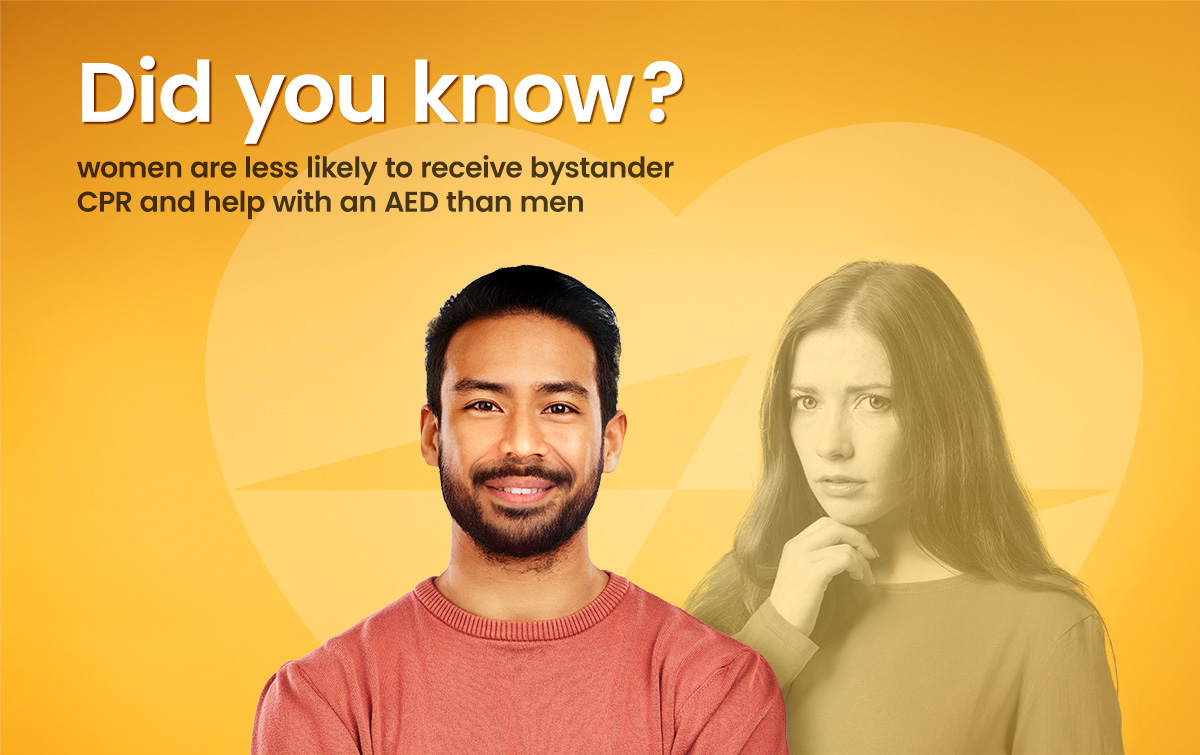Why Women are Less Likely to Receive Bystander CPR and Help with an AED
February 11, 2024

Sudden Cardiac Arrest
Sudden Cardiac Arrest (SCA) affects approximately 365,000 people per year outside of the hospital. It does not discriminate. Sudden cardiac arrest affects people of all ages, races, and genders. It is crucial that when sudden cardiac arrest strikes, immediate CPR is provided and an AED is used quickly to ensure the highest possible chances of survival.
According to research presented at the European Emergency Medicine Congress last year, bystanders are less likely to give CPR to women especially if the SCA takes place in a public area. We know the treatment for SCA is the same for both women and men, so why are women less likely to receive the treatment they need to survive?
Why Women Do Not Recieve the Same Treatment
In a study from the American Heart Association, “men and women said the biggest reason male rescuers would refrain from giving CPR to a woman was fear of being accused of sexual assault or inappropriate touching.” There is also a misconception that you can hurt someone when performing CPR. Although there is a possibility that you can break a rib, if you don’t provide CPR in fear of hurting someone, you are drastically decreasing their chances of survival. It is important to understand that a woman in public that has collapsed and is not breathing is a situation that needs bystander assistance. There should be no fear of hurting someone, assault, or inappropriate touching when providing CPR or using an AED.
Signs & Symptoms
It is also important to understand the signs and symptoms of heart disease, sudden cardiac arrest, and a heart attack in women. Although some of the signs and symptoms are very similar to men, women may show some different warning signs.
It is important that if you or anyone around you is showing these symptoms, that you call 9-1-1 and go to the hospital in an ambulance as soon as possible.
- Uncomfortable pressure, squeezing, fullness or pain in the center of your chest.
- Pain or discomfort in one or both arms, the back, neck, jaw or stomach.
- Shortness of breath with or without chest discomfort.
- Breaking out in a cold sweat
- Nausea
- Lightheadedness
- Back or jaw pain
The most common sign of a heart attack is chest pain but shortness of breath, nausea/vomiting, lightheadedness, back or jaw pain are also common symptoms for women having a heart attack.
There are also some other things to be aware of. First, heart disease is the biggest risk factor for sudden cardiac arrest in women. Women who have suffered a heart attack, but not suffer a sudden death are at a higher risk for sudden cardiac arrest. Some other risk factors include, but are not limited to:
- Coronary Artery Disease
- Depression
- Dilated & Hypertrophic Cardiomyopathy
- Family History
Call, Push, Shock
If you witness a sudden cardiac arrest, regardless of age, race, or gender, follow these steps:
- Call 9-1-1
- Start providing CPR immediately
- Use an AED as soon as possible
To learn more about Defibtech, and to join us on our quest to save lives from sudden cardiac arrest, visit
www.Defibtech.com.
Sources:
https://www.sca-aware.org/sca-news/women-less-likely-to-be-given-cpr-than-men-in-public-places
https://www.sca-aware.org/sca-news/sudden-cardiac-arrest-5-things-women-need-to-know
https://www.heart.org/en/news/2020/11/23/why-people-fear-performing-cpr-on-women-and-what-to-do-about-it
https://www.heart.org/en/health-topics/heart-attack/warning-signs-of-a-heart-attack/heart-attack-symptoms-in-women
